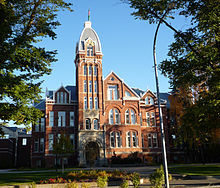Central Washington University
 From Wikipedia the free encyclopedia
From Wikipedia the free encyclopedia
 | |
Former names | Washington State Normal School (1891–1937) Central Washington College of Education (1937–1961) Central Washington State College (1961–1977) |
|---|---|
| Motto | Docendo Discimus (Latin) |
Motto in English | "By teaching we learn" |
| Type | Public university |
| Established | 1891 |
| Accreditation | NWCCU |
Academic affiliations | COP[1] |
| Endowment | $52 million (2021)[2] |
| Budget | $215 million (2021)[3] |
| President | Jim Wohlpart |
| Provost | Michelle DenBeste |
Academic staff | 515 (2018)[4] |
Administrative staff | 500 |
| Students | 12,342 (2018)[4] |
| Undergraduates | 11,419 (2018)[4] |
| Postgraduates | 923 (2018)[4] |
| Location | , , United States 47°00′07″N 120°32′24″W / 47.002°N 120.540°W |
| Campus | Distant town[5], 380 acres (150 ha) |
| Other campuses[6] | |
| Newspaper | The Observer |
| Colors | Crimson and black |
| Nickname | Wildcats |
Sporting affiliations | NCAA Division II - GNAC |
| Mascot | Wellington P. Wildcat |
| Website | www |
Central Washington University (CWU) is a public university in Ellensburg, Washington. Founded in 1891, the university consists of four divisions: the President's Division, Business and Financial Affairs, Operations, and Academic and Student Life (ASL). Within ASL are four colleges: the College of Arts and Humanities, the College of Business (Ellensburg campus and University Centers in the Puget Sound and central regions),[7] the College of Education and Professional Studies, and College of the Sciences. CWU is considered an emerging Hispanic-Serving Institution and 15 percent of its students are Hispanic.[8]
History[edit]
In 1890, the state Legislature established the Washington State Normal School (WSNS) in Ellensburg for "the training and education of teachers in the art of instructing and governing in the public schools of this state."[9] WSNS opened on September 6, 1891, with its first classes held at the Washington Public School in Ellensburg.[10] In 1893, the school's first building was constructed and named Barge Hall, in honor of the first WSNS principal, Benjamin Franklin Barge. Barge Hall was added to the National Register of Historic Places in 1976.
In subsequent years, the university constructed additional campus buildings to accommodate a growing student body including: Kamola Hall (1911); Smyser Hall (1925); Munson Hall (1926); Sue Lombard Hall (1926); and McConnell Auditorium (1935). While Barge Hall's architecture reflected a Richardsonian Romanesque style, the designs of later buildings incorporated elements of proto-Modernism, along with Spanish Colonial Revival, Neo-Classical and Classical Revival styles.[11] In the late 20th and early 21st centuries, as academic programs expanded, construction of new buildings took place: the Science Building I (1997); Black Hall (1998); the Student Union and Recreation Center (2006); Jerilyn McIntyre Music Education Facility (2007); Wendell Hill Hall and Mechanical Building (2008), Barto Hall (2012), Science Building II (2016), and the Samuelson STEM Center (2018).
Name and expansion of programs[edit]
In 1937, the Washington Legislature authorized a name change to Central Washington College of Education. In 1961, reflecting that the curriculum had expanded into new areas of study in addition to teacher education, the school's name was changed to Central Washington State College. With addition of graduate programs and curricula, it became Central Washington University in 1977.
Residential campus[edit]
The residential campus location has multiple residence halls, surrounding the Student Union and Recreation Center, and clustered in four different areas. The STEM and teaching facilities are located near the administrative buildings, which include Black Hall, Bouillon Hall, and the Science Building near Dean Hall (see map on right).



Administrative buildings[edit]
Barge Hall and Mitchell Hall are where the primary administrative staff are located. Admissions, Running Start, a Cashiers Office, the Registrar, and financial aid are all located in this area. This region is bounded by Samuelson Hall and the residential Kamola Hall and Sue Lombard Hall.[12]
Student Union and Recreation Center[edit]
On April 26, 2006, the school opened the $58 million Student Union and Recreation Center. The Student Union and Recreation Center, or SURC as it is abbreviated by students, is home to a full-sized rock-climbing wall, fully equipped gymnasium, and an outdoor recreation office that rents sports equipment.
Wildcat Farm[edit]
The Wildcat Farm [13] at the eastern side of campus grows fresh produce for CWU Dining Services and provides space for students and faculty to run experiments or projects centered around food and farming. Examples have included studying soil carbon respiration, offering K-12 education programs, and piloting dryland winter wheat production.
CWU University Centers[edit]
In addition to the residential campus in Ellensburg, Central Washington University has multiple locations around the state of Washington.
- CWU-Des Moines, located at Highline Community College
- CWU-Everett, located at Everett Community College
- CWU-Lynnwood, located at Edmonds College
- CWU-Pierce County, located at Pierce College
- CWU-Moses Lake, located at Big Bend Community College
- CWU-Sammamish, located at the city-owned facility at 120 228th Ave. N.E.
- CWU-Wenatchee, located at Wenatchee Valley College
- CWU-Yakima, located at Yakima Valley Community College[14]
Research[edit]
This section needs additional citations for verification. (September 2023) |
- The Pacific Northwest Geodetic Array (PANGA) uses real-time GPS measurements to research and measure crustal deformation and mitigate natural hazards throughout the Pacific Northwest. These hazards arise from earthquakes, volcanic eruptions, landslides, and coastal sea-level encroachment. In addition, PANGA GPS measurements are used to monitor man-made structures such as Seattle's sagging Alaskan Way Viaduct, 520 and I-90 floating bridges and power-generation / drinking-supply dams throughout the Cascadia subduction zone, including the mega-dams along the Columbia River. GPS data are telemetered in real-time back to CWU, where they are processed in real-time using both JPL's RTG software as well as Trimble's RTKNet Integrity Manager software to provide relative positioning of several mm resolution.
- The Primate Behavior & Ecology program at Central Washington University offers the only baccalaureate degree in primatology in the world and the sole master's degree in primatology in the United States.[citation needed] The program focuses on non-invasive, observational research with nonhuman primates in field and captive settings. The program also offers the only Captive Primate Care Certificate in the United States and is affiliated with Chimpanzee Sanctuary Northwest. Faculty and students study across the entire primate order, collaborating with scientists and conducting research at sites around the world. Recent published work includes the impact of COVID-19 on mammals at tourism sites,[15] the behavior of Tibetan macaques at the Valley of the Wild Monkeys in China,[16] and the social networks of chimpanzees.[17] The Primate Behavior graduate program is part of the Western Regional Graduate Program, through which student residents of 15 western states pay in-state tuition.
- Wine Quality Research Initiative has identified the nature of wine faults in some wines and how to prevent them. Currently the initiative is directed at detecting and preventing wine fraud, a lucrative and growing crime in the wine import/export business.
Athletics[edit]
CWU students, alumni, and varsity athletes are known as the "Wildcats" and their colors are crimson and black.[18] CWU is part of NCAA Division II and is part of the Great Northwest Athletic Conference.[18] However, the men's and women's rugby teams are NCAA Division I and are usually nationally ranked.
| Fall | Winter | Spring | |
|---|---|---|---|
| Men's | Football, Cross Country, Rugby | Basketball | Baseball, Rugby, Track & Field |
| Women's | Soccer, Cross Country, Rugby, Volleyball | Basketball | Softball, Rugby, Track & Field |
Notable alumni[edit]
References[edit]
- ^ "About -Council of Presidents".
- ^ "University Advancement FY21 Impact Report" (PDF). Central Washington University. January 4, 2022. Retrieved March 26, 2023.
- ^ "CWU Budget Report FY21" (PDF). Central Washington University. July 24, 2020. Retrieved March 26, 2023.
- ^ "IPEDS-Central Washington University".
- ^ "Campus Locations".
- ^ "Central Washington University - Supply Chain Management Education". www.edumaritime.net.
- ^ Redinger, Jade (September 28, 2015). "Yakima Valley Community College and Central Washington University receive a $3.25 million federal grant to support enrollment and transfer". KVEW-TV. Archived from the original on October 22, 2016. Retrieved August 31, 2016.
- ^ Mohler, Samuel M (1967). The First 75 Years: A History of Central Washington State College (PDF). Spokane, WA: Central Washington State College. pp. 5–6. Archived from the original (PDF) on September 9, 2018. Retrieved June 9, 2013.
- ^ Mohler 1967, pp. 12
- ^ Walton, Lauren (January 2015). "Building a History: Evaluation of Central Washington University Campus Buildings to Determine Eligibility for Listing on the National Register of Historic Places". All Master's Theses. Central Washington University. Retrieved September 2, 2016.
- ^ "Student Accounts | Contact Us". www.cwu.edu. Archived from the original on August 10, 2016. Retrieved March 10, 2016.
- ^ Wildcat Farm
- ^ "About CWU | CWU Campus Locations". www.cwu.edu. Retrieved March 10, 2016.
- ^ Usui, Rie; Sheeran, Lori K.; Asbury, Ashton M.; Blackson, Maurice (2021). "Impacts of the COVID‐19 pandemic on mammals at tourism destinations: A systematic review". Mammal Review. 51 (4): 492–507. doi:10.1111/mam.12245. PMC 8014658. PMID 33821078.
- ^ Li, Jin-Hua; Sun, Lixing; Kappeler, Peter M, eds. (2020). The Behavioral Ecology of the Tibetan Macaque. Fascinating Life Sciences. doi:10.1007/978-3-030-27920-2. ISBN 978-3-030-27919-6. S2CID 208145425.
- ^ Funkhouser, Jake A.; Mayhew, Jessica A.; Mulcahy, John B. (2018). "Social network and dominance hierarchy analyses at Chimpanzee Sanctuary Northwest". PLOS ONE. 13 (2): e0191898. Bibcode:2018PLoSO..1391898F. doi:10.1371/journal.pone.0191898. PMC 5812591. PMID 29444112.
- ^ a b "Central Washington University". NCAA. Retrieved October 28, 2012.